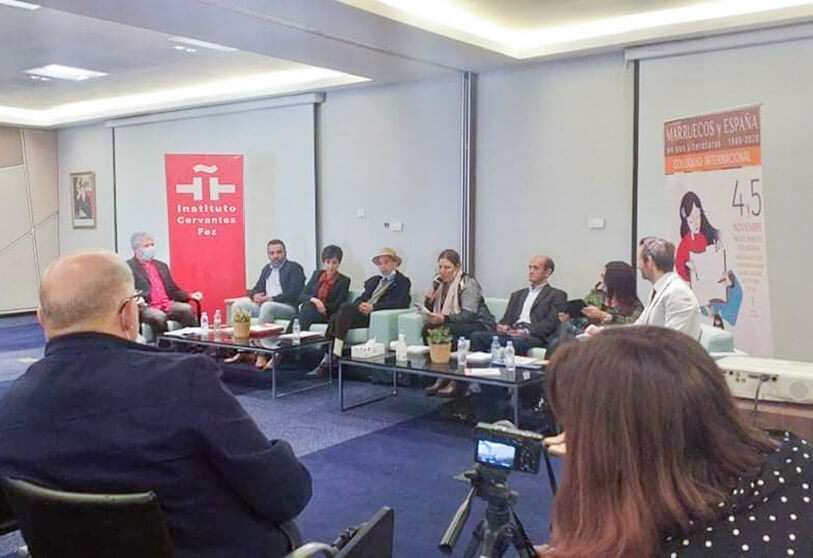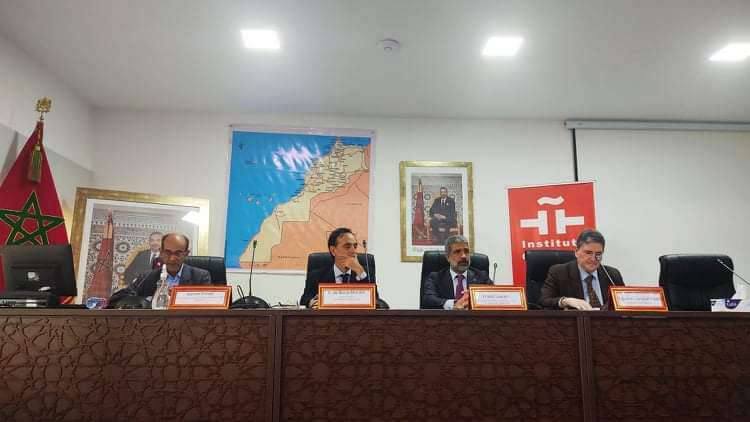Fez invita a reflexionar sobre la mirada del “otro”, componente de lo propio

"To be a space for dialogue on the discursive representations of the Spanish and Moroccan in the literatures of the two countries", such is the aim of the International Colloquium on Morocco and Spain in their Literatures (1980-2020), which, as the title states, is a colloquium that explores the gaze towards the other, neighbour and component of one's own, through the respective literatures of Morocco and Spain. More than twenty academics, literary critics, translators, and writers from more than a dozen Spanish and Moroccan cities took part in this colloquium, which was held on 4 and 5 November 2021 in Fez. The papers were divided into four discussion tables, within which 22 papers were distributed, in addition to an inaugural conference.
At the start of the event, Dr. Khalid Lazaâre, dean of the Faculty of Letters and Human Sciences Dhar Lmhraz of Fez (FLDM), mentioned that literature will be reflected upon from the shared experiences between Morocco and Spain. Dr. Lazaâre also encouraged all those present to make this colloquium a tradition, which is expected to become established in the years to come. In the same vein, the Counsellor for Cultural Affairs of the Spanish Embassy in the Kingdom of Morocco, Francisco de Borja Morate Martín, emphasised the strong institutional support of the Spanish Embassy in Rabat for these events that strengthen Spanish-Moroccan relations and highlighted the work that the Department of Hispanic Studies in Fez is carrying out in the field of the mutual perception of Spanish and Moroccan people and how it is reflected in the respective literatures. In another fundamental point of this opening session, the director of the Instituto Cervantes in Fez, Miguel Ángel Sanjosé Ribera, stressed that: "the Spanish language is not a foreign language in Morocco, as it has accompanied it for centuries in its historical vicissitudes since the Middle Ages". He went on to explain that this type of intercultural exchange event is an invitation to "overcome old prejudices and stereotypes" between our two peoples. At the opening ceremony, Dr. Kamal Ennaji, head of the Department of Hispanic Studies at the LWF, representing the organising committee of the Colloquium, spoke of the need to be aware of our common responsibility: "Every neighbourhood imposes responsibilities, and the future depends on these responsibilities". His intervention therefore covered the importance of literature in advancing cultural diplomacy.

The inaugural lecture was given by Dr. Aziz Tazi, professor at the FLDM, who delved into the production of Moroccan literature in Spanish, posing the following question for his lecture: Moroccan literature in Spanish: a one-day flower or a serious thing? A question that aroused the curiosity of the audience, who were expecting a clear-cut answer, but the lecture was a point of reflection on the literature in question, warning, by way of synthesis, that this literature: "It will cease to be a one-day flower and will become something serious, consolidated, normalised and with signs of continuity when we stop talking about it as a colonial residue, as a neo-colonial literary manifestation; when, in short, we stop doing the sociology of literature and begin to tackle, at last, immanent aspects, proper to literary and stylistic studies. But first, this literature has to reach sufficient maturity and the necessary quality to merit this type of analytical approach".
In accordance with the approach of the inaugural conference, the first session of the colloquium was opened by Dr Abrighach Mohamed, Director of the Laboratory for Research on Morocco and the Hispanic World (LIMHIS) at the Ibn Zohr University of Agadir, with a paper entitled: "Is Moroccan literature in the Spanish language colonial? Professor Abrighach argued historical and cultural factors related to Spain's conservative colonial policy in Morocco, before concluding that the literature in question is: "A post-colonial literature" that made Spanish "a sign of cultural identification with Spanishness and of double-edged resistance against administrative, educational and cultural Francophonisation, and doctrinaire ideological pan-Arabism".

As for Dr. Aziz Amahjour, head of the Department of Hispanic Studies at the Pluridiciplinary Faculty of Nador, his presentation consisted of a reflection on the first stories of Moroccan literature in Spanish: "La proscrita" by Abdelatif Jatib (1953) and "Sulija" by Mohamed Abdeselam Temsamani (1955), both published in the magazine Ketama. This reflection was supported by the analysis and study of certain details related to the texts and the general context in which they were produced.
Dr. Hassane El Arabi, from the same faculty, was asked to scrutinise the Spanish element in the novel "The colour red in the Rubik's cube" by the writer Hamid El Boubkari. For Dr. El Arabi, the novel embodies: "The voice of a generation that narrates events that are still alive in the soul of the proud Rifian who needs to unburden himself and confirm himself as a free being who does not admit outside interference in his public and private life".

While professors Dr. Abderrahmane Belaaichi from the University of Agadir, Dr. Fatima Larouz, head of the Department of Hispanic Studies at Meknes, and Professor Rubén José García Muriel, reader at the FLDM, agreed that their presentations made the novel by Najat El Hachmi, winner of the 2021 Nadal Prize, an object of study and analysis. Through "Foreign Daughter", Professor Belaaichi focused his analysis on the use of the language, Catalan or Amazigh, which infused the novel with a back-and-forth between the two languages in search either of refuge (affective) or of pure lexical and linguistic accuracy. In turn, Professor Larouz, since "The Last Patriarch", has studied the use of humour and irony as mechanisms of transgression of cultural, political, religious and social elements pre-established in society, as well as being devices for denouncing taboos. For his part, Professor Rubén Muriel has devoted himself to studying some examples of the literary prototype of the mother in various novels by the Amazigh-Catalan writer. The protagonists are characterised by: "the complexity of their origin, their isolation in the host society and their capacity to be "transmitters of memory" between generations".
The following three sessions were devoted to study and debate: "Morocco in Spanish literature"; "Language, literature and translation"; and "Perspectives on the Spanish-Muslim past". These sessions brought together specialists from both sides of the Strait of Gibraltar and their papers were entitled: Sergio Barce Gallardo (Palma de Mallorca): "Moroccans as main characters in my works (narrative and cinema)", José Sarria Cuevas (Málaga): "Identity as a creative element in trans-border authors and authors of the border. The case of Mohamed El Morabet and Sergio Barce", Sahar Ouafqa (Fez): "The journey, or the reconstruction of the past in the postmodern novel. 'Un solar abandonado' (2018) in example", Khadija Karzazi (Mohammedia): "Morocco as seen by three current Spanish women writers", Abderrahmane Laaouina (Rabat): "Representation of the Moor in Ahlán by Jerónimo López Mozo", Mohamed Ouahib (Fez): "La inmigración ilegal en la novela Harraga de Antonio Lozano", David Fernández Vítores (Madrid): "La presencia del español en Marruecos. A look towards the future", Mounia Mabrouk (Fez): "Moroccan socio-cultural aspects in the work of Juan Goytisolo: designation, reference and translation", Alicia Cid Gómez (Fez): "In the limits of the dream. El realismo mágico de Aicha Bassry", Hassan Boutaka (Casablanca): "Cervantes speaking Moroccan: El juez de los divorcios en dariŷa y amazigh (tachelhit)", Moumene Essoufi (Morocco): "Cervantes speaking Moroccan: El juez de los divorcios en dariŷa y amazigh (tachelhit)". Moumene Essoufi (Oujda): "Kabileño de Salvador López Becerra o cuando el acercamiento conduce al conocimiento del otro", Kamal Ennaji (Fez): "El mundo andalusí en La huella de las ausencias de Miriam Palma Ceballos", Ahmed El Gamoun (Oujda): "Al-Ándalus como espejo de las Meninas: lectura en la elegía de Hassan Aourid El suspiro del morisco", Miguel A. Moreta-Lara (Málaga): "Damas viajeras a través del Islam", Mohamed Barrada (Fez): "La literatura secreta de los moriscos vista desde la actualidad", and Mohamed Saadan (Rabat): "El peligro morisco como Razón de Estado en tiempo de expulsión: la imagen manipulada de la minoría". Although most of the papers dealt with literature, there were also talks on translation, the Spanish language in Morocco and everything related to the gaze towards the other, whether by Moroccans or Spaniards.

Likewise, the organisers of the colloquium, led by its coordinator, Dr Kamal Ennaji, have fulfilled the objectives set for this event, which state that: "The human background is the only basis for the raison d'être of selfhood and otherness".
It should be noted that all the sessions have been recorded and will soon be available on the YouTube page of the Instituto Cervantes in Fez and will also be compiled and published by the Dhar Lmhraz Faculty of Arts and Human Sciences in Fez.
*Sergio Barce Gallardo and José Sarria Cuevas were unable to attend the colloquium due to the mismatch between the dates of the colloquium and available flights, but their papers were published in the proceedings.









